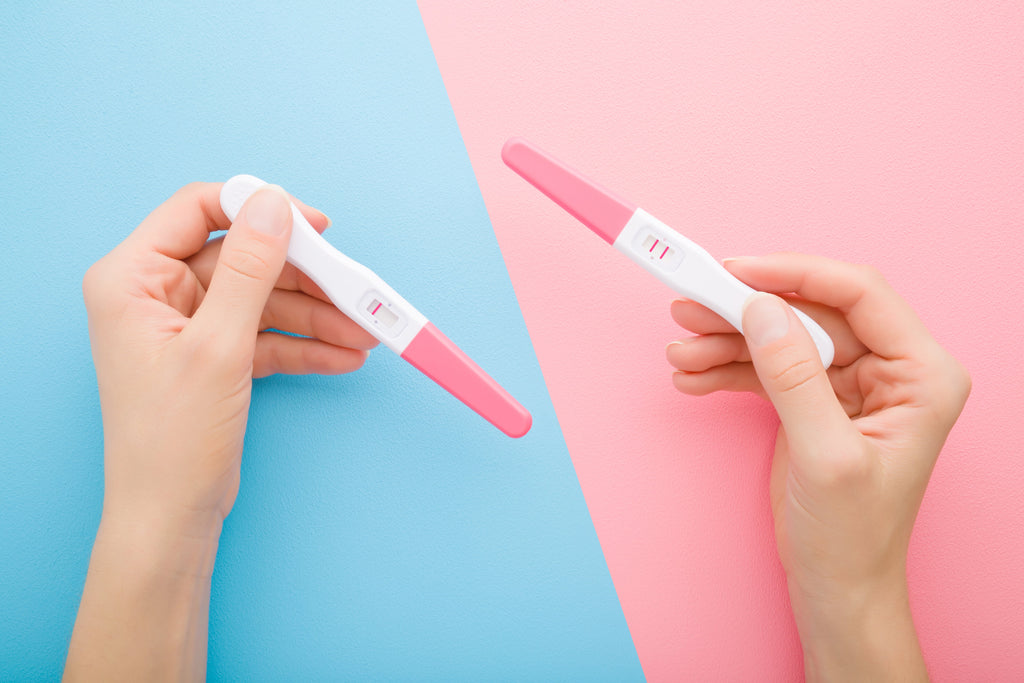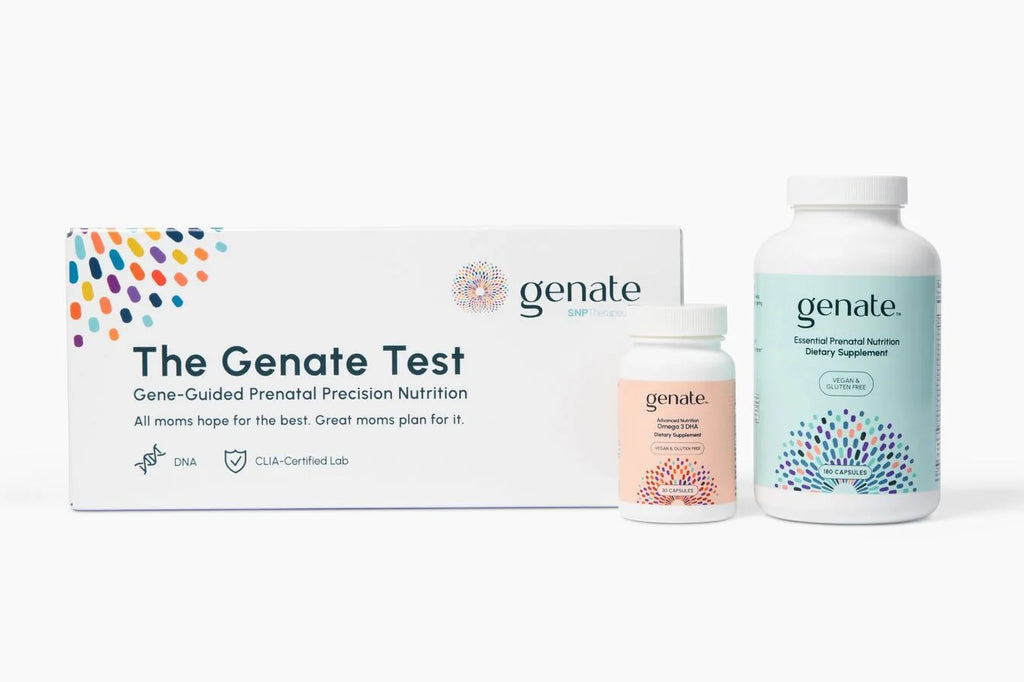Why Should I Get Nutrigenetic Screening Before Choosing a Prenatal Vitamin?
Learn how genetic testing can help you choose prenatal nutrition tailored for your body.
Updated on November 30th, 2023
If you are pregnant or trying to conceive, your doctor has probably told you to take prenatal vitamins. These one-size-fits-all vitamins have many of the vitamins and minerals you need for a healthy pregnancy.
However, studies show that 70% of women have at least one genetic variant that could affect how the nutrients they eat get passed on to their babies. Therefore, instead of taking a general prenatal vitamin, you can take a DNA nutrition test to learn the best balance of vitamins, minerals, and other essential compounds that will provide optimal growth and cognitive development for your baby.
Genetic testing, such as the Genate Test, examines how your genetics contribute to potential nutritional deficiencies that could affect your baby’s growth and cognitive development. You can then work with a nutrition counselor to create a customized diet and supplement plan that supports your baby’s nutritional needs.
What is nutrigenetic testing?
Nutrigenetic testing, also called nutrigenetic screening, looks at your genes to understand how your body processes food and nutrients. It checks for specific gene variations that can affect your metabolism, absorption, and transport of nutrients.
The results of nutrigenetic screening can be used to create a customized diet plan tailored to your genetic makeup.
When is the best time to get nutrigenetic screening?
The best time to get a DNA nutrition test is before trying to conceive or early in the first trimester of pregnancy. This way, you will be armed with information on the best diet and supplement regimen for your unique genetic profile. This is especially true if you have variants in your folic acid pathways, because neural tube defects occur in the first trimester.
What are prenatal vitamins?
Prenatal vitamins are specially formulated dietary supplements designed to fill basic nutritional gaps and ensure that the expecting mom receives adequate nourishment for a healthy pregnancy and baby.
During your preconception or early prenatal appointments, your doctor or midwife will recommend that you take a prenatal vitamin. Most prenatal vitamins contain a combination of vitamins and minerals essential for healthy development. However, common over-the-counter prenatal vitamins do not account for your unique genetic differences in how your body uses vitamins and minerals.
This is where nutrigenetic testing can fill in the gaps by identifying any inefficiencies in your nutrient pathways. Then you can find prenatal supplements that will support optimal health for you and your baby.
Key vitamins and minerals in pregnancy
What kind of essential vitamins and minerals do you need during your pregnancy that genetics might affect? We list a few of the key factors that you might want to support with custom prenatal supplements below:
DHA
DHA is an omega-3 fat that supports the growth of a developing baby’s brain, eyes, and immune system. Studies show that DHA should be taken during all trimesters of pregnancy for the most benefit. Some women have a variant gene that reduces the transport of DHA in the body. Get genetic testing before conception to determine if you need to add more DHA to reach recommended levels for your baby to develop appropriately.
Folate
Folate, also known as vitamin B9, is a vitamin that prevents neural tube defects called spina bifida and anencephaly. Studies show that up to 30% of people have genetic variants in a protein involved in turning folic acid, the synthetic form found in supplements and fortified foods, into the active form of folate that can be used by your body. Therefore, testing of genes involved in folate metabolism can tell you if you need to take more folic acid than is typically recommended.
Early detection of genetic variants in folate pathways is essential because the neural tube is formed and closes in the first six weeks of pregnancy. Folate is also associated with the DNA methylation process, and alterations in this process have been associated with a range of maternal conditions during pregnancy, including preeclampsia, hypertension, diabetes, and pregnancy loss.
The Genate Test
Using a prenatal genetic nutrition test, we help expectant mothers understand how their diet and genetics impact their developing baby. The Genate Test focuses on five metabolic pathways and 325 genetic variants to determine how your unique genetic profile can cause nutrient deficiencies essential for fetal growth and cognitive development. With the test results and nutrition counseling provided by our team of registered dietitians, you can customize your diet and supplement intake to optimize fetal growth and your baby’s overall growth and development.
References
Prenatal vitamins. American Pregnancy Association. https://americanpregnancy.org/healthy-pregnancy/pregnancy-health-wellness/prenatal-vitamins/ Published December 29, 2022. Accessed November 15, 2023.
Herrera E, Ortega-Senovilla H. Dietary implications of polyunsaturated fatty acids during pregnancy and in neonates. Life (Basel). 2023;13(8):1656. https://doi.org/10.3390/life13081656
Dias S, Willmer T, Adam S, Pheiffer C. (2022). The role of maternal DNA methylation in pregnancies complicated by gestational diabetes. Front Clin Diabetes Healthcare. 2022;3. https://doi.org/10.3389/fcdhc.2022.982665
Korsmo HW, Jiang X, Caudill MA. Choline: Exploring the growing science on its benefits for moms and babies. Nutrients. 2019;11(8):1823. https://doi.org/10.3390/nu11081823
Friso S, Choi S-W, Girelli D, Mason JB, Dolnikowski GG, Bagley PJ, et al. A common mutation in the 5,10-methylenetetrahydrofolate reductase gene affects genomic DNA methylation through an interaction with folate status. Proc Natl Acad Sci USA. 2002;99(8):5606–5611. https://doi.org/10.1073/pnas.062066299
More Articles:
Take the Genate Test
Learn how to tailor your pregnancy nutrition to your unique genetic signature.




